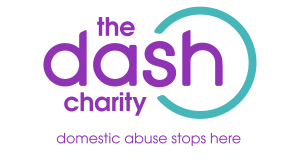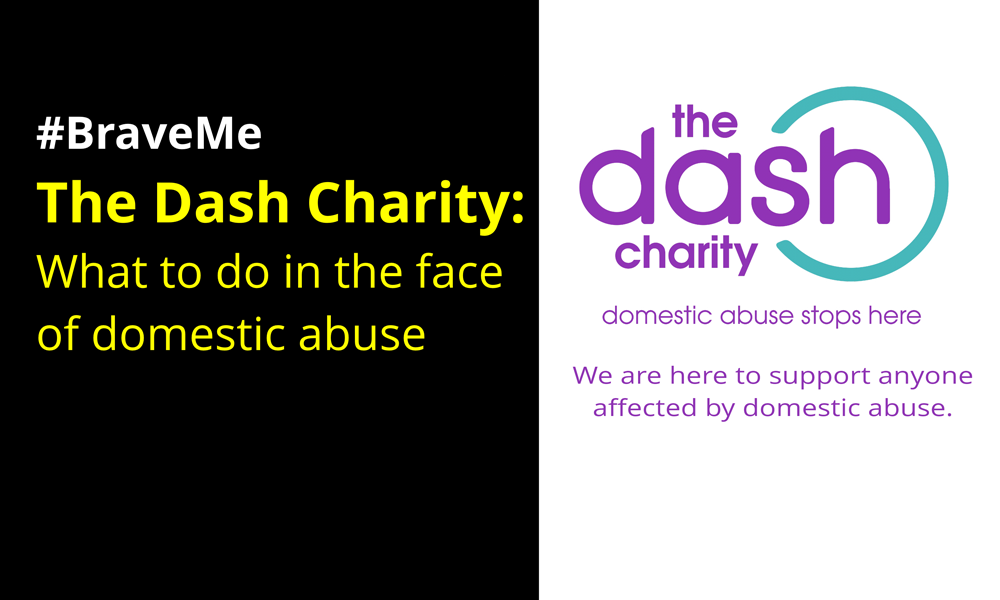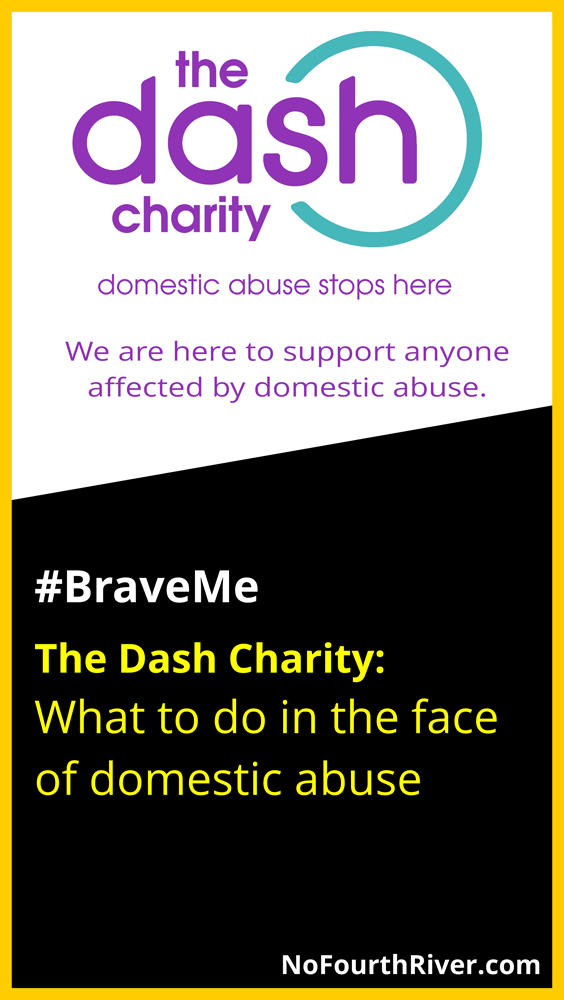The Dash Charity uses their experience supporting survivors of domestic abuse to weigh in on the #BraveMe campaign and share with us what to do in the face of domestic abuse.
Through this book (No Fourth River) Christine has bravely shared her experiences, offering a valuable insight into the cycles of abuse, the devastating impact it can have and the despair that can be felt ‘behind closed doors’. The times when you can feel hopeless, like you are the only person in the world going through this, when it seems like there will never be a happy future – you struggle to look forward and are tormented by the past. However, this story is proof that no matter what you have been through, you can dig deep and find the strength and resilience to move forward to a more positive life FOR YOU.
All of this takes time – some people will recover more quickly than others, and most will never be able to forget, but you don’t have to let abuse define you. It shapes you and moulds you into a slightly different person – but this can be a better version of yourself that you create.
All of this takes time – some people will recover more quickly than others, and most will never be able to forget, but you don’t have to let abuse define you. It shapes you and moulds you into a slightly different person – but this can be a better version of yourself that you create. Instead of being controlled by someone who tells you that you are too fat, too ugly, too stupid to do anything, you can explore new challenges, find new strengths and put the past behind you.
Domestic abuse and child abuse have always been taboo subjects and make for uncomfortable conversation, but it is vital this changes and as more survivors speak out, this encourages others to find the help they need. Two women a week are murdered by a current or former partner and 1 in every 5 children will live with domestic abuse. Domestic abuse and child abuse is pernicious with devastating effects but there is help out there, so those uncomfortable conversations need to happen.
Through empowerment, support, advocacy and in time, victims begin to flourish and regain their sense of self-belief, as well as the safety they have been denied, and become survivors.
Most people experiencing abuse don’t get the help they need until it reaches crisis point – this is too late. It can be extremely difficult to recognise abusive behaviour, especially if the abuse is not physical, but emotional or more subtle such as financial abuse and isolation. To then have to speak up and disclose abuse is a very scary thing to do – when you are told nobody will believe you when you have kept the abuse hidden from others, to be able to articulate and voice what is happening to you takes immense courage. When we meet clients for the first time they often seem withdrawn, anxious and unsure of themselves or how to make any decisions – this is because they have been controlled by someone who has isolated them, destroyed all their confidence and made them question every single aspect of their life. Through empowerment, support, advocacy and in time, victims begin to flourish and regain their sense of self-belief, as well as the safety they have been denied, and become survivors.
Children learn to explore the feelings they have hidden for so long and can become children again. They thrive instead of having to deal with issues no child should ever have to experience.
More needs to be done to teach children how to keep themselves safe, to understand what a healthy relationship is and to grow up with confidence, resilience and good self-esteem.
Research shows that both children and adults have to tell someone several times before they get the help they need. We must believe them! Children do not lie about abuse and we need to take any disclosures seriously and act on it. We can’t continue to live by the rule of optimism and keep our fingers crossed that it will all go away or will work out in the end. Instead of waiting for disclosures we need to ask the question, take responsibility and not assume that someone else is looking out for them.
The fact is that most (not all) perpetrators are men – we need more positive male role models to show boys how to behave in non-abusive ways, to stand up against negative and abusive behaviour towards women. Abuse is not just a women’s issue – it is a men’s issue too!
Wider society also needs to make a stand – there need to be more accountability in the criminal justice system, less victim blaming in the media, better training for professionals such as social workers, police officers and teachers, and employers need to provide better support and safety at work. We should be a society with a zero-tolerance approach to domestic abuse.
If you are aware a child is being abused or living in an abusive environment, please tell someone – you can do this confidentially. Never assume that someone else is dealing with it.
If an adult you know is being abused, let them know you are there for them – don’t push them to make decisions – believe them and encourage them to seek specialist support. If they aren’t ready to do this, don’t turn away – let them know you will be there for them when they need it – that time will come, when the time’s right for them.
It is vital that anyone experiencing abuse gets specialist support before making any decisions. There are services in most local areas – if they can’t support you, they will put you in touch with someone who can. These specialist services are independent, confidential and non-judgemental, and if you are an adult, you won’t be pushed into making any decisions you are not ready to make. They’ll help you consider your options and most importantly stay safe. If you are a child who needs help, please reach out and tell someone you trust – this could be a teacher, a youth worker, anyone you feel comfortable telling.
The most important piece of advice we can give is to speak up – abuse thrives on secrecy. If we talk about it, if we don’t tolerate it, if we bring abuse out from behind closed doors, then we can protect our future generations and create a culture where abuse no longer exists.
You can read the #BraveMe stories of those who are turning their lives around here.
We want to hear about your inspiring #BraveMe story too. Click here to find out more about submitting your story.
 Hello, we’re The Dash Charity (formerly Berkshire East & South Bucks Women’s Aid), supporting women, men and children affected by domestic abuse.
Hello, we’re The Dash Charity (formerly Berkshire East & South Bucks Women’s Aid), supporting women, men and children affected by domestic abuse.
We’re an independent charity so we can offer a service that’s completely confidential and ensures you’re never short changed on the level of attention you’re given.
Follow The Dash Charity: Website | Twitter
If you need help or advice please ring:
National Domestic Violence Helpline – this is free and open 24 hours a day – Tel: 0808 247 2000
National Society for the Prevention of Cruelty to Children (NSPCC) – Tel:08088005000
Childline – Tel:08001111
For help in East Berkshire area or for further information about our work, please ring: The Dash Charity – Tel: 01753 549865

 </
</